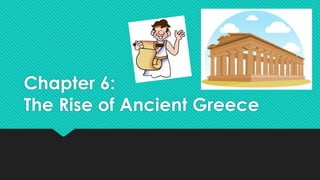
Ancient Greece Rise Civilization City-States Democracy
- 1. Chapter 6: The Rise of Ancient Greece
- 2. Chapter 6, Section 1: “The Rise of Greek Civilization” šEpic: A long poem that tells a story šAcropolis: A high, rocky hill where early people built cities šCity-State: A city with its own traditions, government, and laws; both a city and a separate independent state
- 3. Chapter 6, Section 1: “The Rise of Greek Civilization” šAristocrat: A member of a rich and powerful family šTyrant: A ruler who takes power with the support of the middle and working classes šDemocracy: A form of government in which citizens govern themselves
- 4. Greece’s Geographic Setting • Greece is a country made up of peninsulas. • Peninsula: An area of land surrounded by water on three sides. • Mountains are the major landform of Greece. Greece’s islands are mostly mountain peaks. • Only about 1/5 of Greece is good for growing crops. • The geography of Greece made it hard for people from different communities to get together. (Most people lived on islands surrounded by water or were separated by mountains.) • For this reason, ancient Greek communities thought of themselves as separate countries.
- 6. Minoan Civilization šFrom about 3000 to about 1100 B.C., Bronze Age people called the Minoans lived on the island of Crete. šWashed by the waters of the Aegean and Mediterranean Seas, Crete was an ideal place for the Minoans to develop a broad sea trade network. šA grand palace once stood in the ancient Crete city of Knossos. šIn the middle of the 1400s B.C., Knossos was destroyed, and Minoan civilization declined. šPeople from mainland Greece, the Mycenaeans, were likely the invaders.
- 7. The Mycenaeans šAfter the Mycenaeans came into power, mainland and island cultures blended. However, the focus of these cultures moved to the mainland, where the city of Mycenae was located. šAt the height of their power, around 1400 B.C., the Mycenaeans controlled the Aegean Sea and parts of the Mediterranean Sea. šThe Minoans had gained much of their power through trade. Although the Mycenaeans traded widely, they relied upon conquest to spread their power.
- 8. The Trojan War š Greek myth tells the story of the Trojan War, a long struggle between Greece and the city of Troy. It’s possible that Mycenaean warriors inspired this legend. š According to the myths, the Greeks conquered Troy by using a trick- the Trojan Horse. šGreek warriors hid inside a huge wooden horse. The horse was rolled to the city gates. Thinking it was a gift, the Trojans brought the horse into their city. During the night, the Greek soldiers climbed out of the horse and let the rest of the army into Troy. šThe Greeks burned and looted Troy and then returned home.
- 9. The Trojan War, Continued š Two epics, or long story-telling poems, about the Trojan War survive today. š Iliad š Odyssey šThese poems are credited to a poet called Homer. š These poems were important to the Greeks. They taught them what their gods were like and how the noblest of their heroes behaved. š Today, people think these poems came from stories memorized by several poets and passed down by word of mouth through many generations. š Most historians agree that the Trojan War did not happen exactly as Homer described it.
- 10. The Dark Ages of Greece š Not long after the end of the Trojan War, civilization in Greece collapsed. These years (1100s B.C.– 750 B.C.) have been called Greece’s Dark Ages. šPeople no longer traded for food and other goods beyond Greece due to poverty. šThe art of writing was lost due to focus on survival. š Greece’s Dark Ages were not completely bleak! During this time, families gradually began to resettle in places where they could grow crops and raise animals. šPeople favored places near rocky, protected hills. They would build structures to protect them from attack. The name for such a fortified hill was acropolis, meaning “high city.”
- 11. City-States Develop šA city-state is not only a city, but also a separate independent state. City-states developed around 750 B.C. in Ancient Greece. Each city-state included a city and the villages and fields surrounding it. šBy the end of Greece’s Dark Ages, most city-states were ruled by aristocrats, members of the rich and powerful families.
- 12. A New Type of Ruler šGradually, military strength in the cities shifted from aristocrats to merchants and artisans due to a growing middle class. šAs a result of these changes, aristocratic governments were often overthrown and replaced by tyrants. šA tyrant is a ruler who seized power by force. šTyrants were usually supported by the middle and working classes. šToday, we usually think of tyrants as being cruel and violent. That was true of some Greek tyrants, but others ruled wisely and well.
- 13. Democracy in Greece š Eventually, the people of many city-states overthrew tyrants. Some of the cities adopted a form of government called democracy. šIn a democracy, citizens govern themselves. šThe city-state in which democracy was most fully expressed was Athens. š About 594 B.C., a wise Athenian leader called Solon won the power to reform the laws. Solon was well known for his fairness. His laws reformed both the economy and government of Athens. šOne of his first laws canceled all debts and freed citizens who had been enslaved for having debts. šAnother law allowed any male citizen of Athens aged 18 or older to have a say in debating important laws.
- 14. Democracy in Greece, Continued šNot everyone living in ancient Athens benefited from democracy. Only about 1 in 5 Athenians was a citizen. šTo be a citizen, a man had to have an Athenian father and mother. šThose enslaved, as well as women and foreigners, did not take part in democracy.